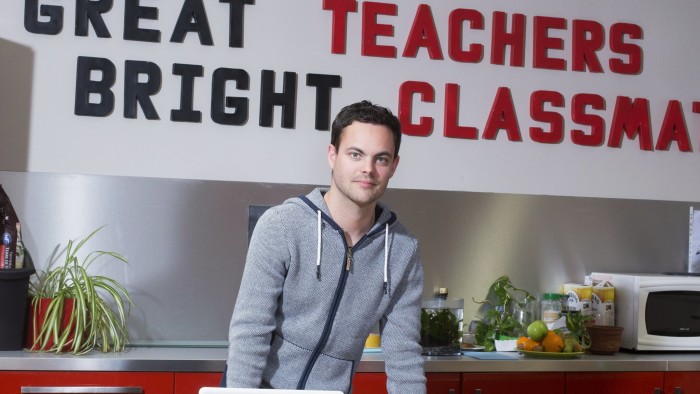Moocs platform OpenClassrooms aims to fill UK tech skills gap

Simply sign up to the Business education myFT Digest -- delivered directly to your inbox.
Massive open online courses, or Moocs as they are known, might have started with a gush of altruism, but the mood music has changed.
Course providers that produce the online programmes or host them on digital platforms are becoming more serious about revenues, are more aware of their competition and are making bold claims about how they can help solve skills gaps — even in developed countries.
Among the boldest is OpenClassrooms, a Paris-based Mooc provider that specialises in teaching people how to code. In April last year it hit the headlines when the French president, François Hollande, announced that the company would allow registered jobseekers access to its €20-a-month premium model, which offers certificates for satisfactory completion of its free courses.
The programme went live last autumn and 20,000 jobseekers have already registered. “With the sign-ups we’re seeing, we’re confident that we’ll have 30,000 people in jobs by 2017,” says Mathieu Nebra, OpenClassrooms’ co-founder. He says the company has 1.7m registered vocational learners.
Now it is aiming at the UK market. “We believe OpenClassrooms can help bridge the UK’s IT skills gap,” says Mr Nebra. “It won’t happen overnight for sure”, but he believes his company, with its focus on vocational skills, has the right offering.
Mooc providers say OpenClassrooms will face serious competition, particularly since only a small number of its more than 1,200 courses are currently in English.
“It’s a very, very crowded market,” says Simon Nelson, chief executive of FutureLearn, the UK’s largest Mooc provider and an offshoot of the Open University, a distance-learning and research institution founded in 1969. He points to incumbents in the UK market such as General Assembly, a specialist digital skills provider. And he says FutureLearn itself, which has more than 3.2m registered learners, is also trying to widen access to digital skills.
There certainly appears to be strong demand in the UK for such programmes. Coursera, the world’s largest Mooc platform with more than 18m registered students, says data and computer science courses are the most popular among its half a million UK learners — nearly a third of whom signed up for courses in this category.
It is also hoping to cash in on demand and launched what it claims is the first Mooc-based masters in data science at the end of March. Tuition fees for the degree in partnership with the University of Illinois, which Coursera is keen to promote in the UK, will be $19,200.
With such an array of options, it is unsurprising that Ian Fordham, chief executive of Edtech UK, an education technology accelerator, and co-founder of The Education Foundation, a UK-based think-tank, also thinks that OpenClassrooms might have its work cut out in convincing learners to choose its courses and to win UK government endorsement.
“I suppose part of it is, what kind of digital skills gap is it trying to tackle?” says Mr Fordham, who says there is almost a saturation of options to learn how to code. “To say that one product is going to have the answer to the UK’s digital skills gap is naive,” he says, adding that some Mooc providers seem to be focusing on competition rather than collaboration.
OpenClassrooms might sound competitive in its plans for expansion but it is also embracing the spirit of collaboration with its partners. It has attracted corporate backers including Google, Microsoft and IBM. Mr Nebra says partner companies want people to learn how to use their product innovations so OpenClassrooms helps design their courses. “They pay us for that,” says Mr Nebra adding that OpenClassrooms has just finished working with IBM on a Mooc that teaches how to use Bluemix, a cloud platform for building, running and managing apps.
Its business school partners are Paris School of Business and ICD International Business School, while other academic partners include the prestigious École Polytechnique and the Paris Institute of Political Studies (Sciences Po).
Bruno Martinaud, director of the masters in technology venture at École Polytechnique sees Mr Nebra and his OpenClassrooms co-founder, Pierre Dubuc, as leading lights in online education. His department has paid OpenClassrooms to help redesign and produce some of its programmes so they are suitable for online learning — there are two tech-based entrepreneurship courses on the platform and plans to launch more later this year.
But can Moocs really make a difference? Rick Levin, chief executive of Coursera, believes they can. He points to what he calls “the most definitive study” on Mooc benefits, which was published last autumn by a research team from Coursera, the University of Pennsylvania and the University of Washington.
More than half of 52,000 respondents said their primary goal had been to improve their current job or to find a new one, and of those seeking a career boost, 87 per cent reported a benefit of some kind. Crucially, researchers found that less privileged course completers were most likely to report a tangible career benefit. The research came out after Mr Hollande’s announcement, but could represent an endorsement of OpenClassrooms’ ambition.
The company is talking to “public employment services” outside France, according to its website. While Mr Nebra would not confirm whether those approaches included a direct one to the relevant authorities in the UK, he believes there is strong demand.
“Why aim at the UK market? It’s been something that people have been asking for.”
Comments